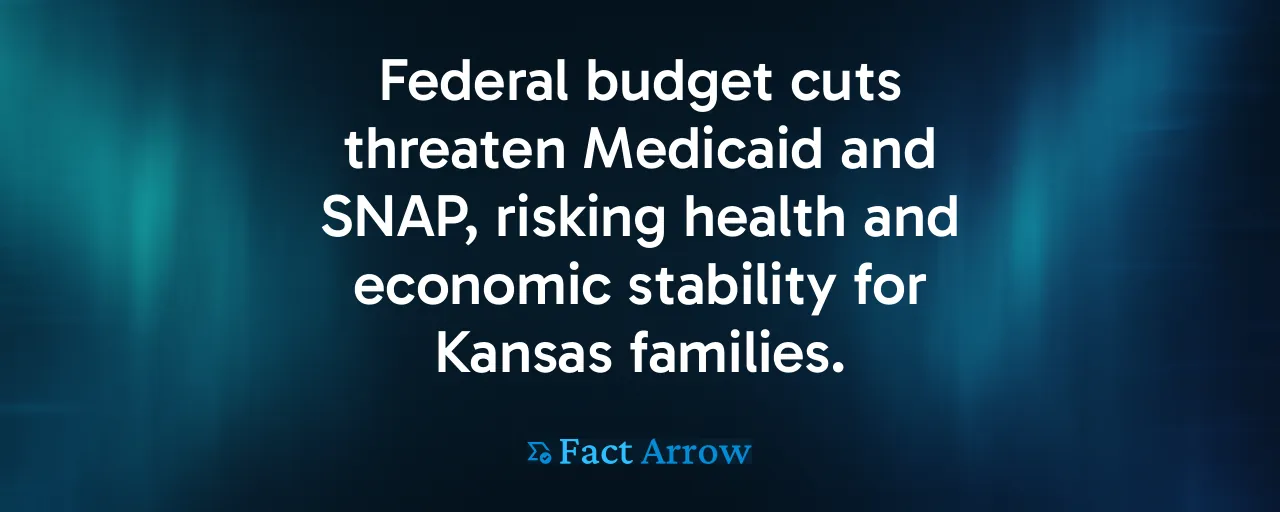A Looming Crisis in Kansas
Last week, Governor Laura Kelly warned on a federal budget bill that could reshape Kansas. In an interview with KWCH-TV, she warned the proposed cuts to Medicaid and SNAP could severely impact the health and economic stability of countless families. The 'One Big Beautiful Bill Act,' now moving through Congress, seeks to reduce federal spending on these programs, shifting costs to states like Kansas. For a state where over 366,000 people rely on Medicaid and 275,000 depend on SNAP, the stakes are high.
The bill introduces stricter eligibility rules, work requirements, and reduced federal funding. Kansas could lose billions in health care dollars and face new administrative burdens. The ripple effects would touch rural hospitals, local economies, and household budgets. It is important to examine what is at risk and how to protect the most vulnerable.
The Human Cost of Cuts
Medicaid covers nearly one in eight Kansans, including children, people with disabilities, and pregnant women. Manatt Health estimates that 13,000 residents could lose coverage under the proposed changes, with the state facing a loss of $3.77 billion over a decade. Families USA projects a more significant impact, with up to 75,000 Kansans potentially uninsured. For rural communities, where 63 hospitals are already at risk of closing, these losses could mean longer drives for emergency care or no care at all.
SNAP, which supports 275,000 Kansans, faces a $300 billion national cut. Urban Institute data shows families could lose $72 monthly, a significant financial challenge for those already stretching budgets. Children, who make up half of Kansas SNAP recipients, would bear the brunt. Food insecurity would rise, straining food banks and worsening health outcomes. These programs provide essential support, lifting 8 percent of Kansans above the poverty line.
Rural Kansas on the Brink
Rural hospitals are the backbone of Kansas communities, but many face significant challenges. Since 2010, twenty have closed or faced financial distress. The Commonwealth Fund links every $1 billion in Medicaid cuts to 17,000 job losses nationwide, and Kansas could lose 4,900 jobs. Uninsured patients drive up uncompensated care, forcing hospitals to raise prices or shutter. Local taxes could spike to cover the shortfall, squeezing families further.
Work Requirements and Hidden Barriers
The bill's work requirements, extending to adults up to age 65, aim to boost self-reliance. However, evaluations of similar mandates, like Arkansas's Medicaid waiver, indicate modest job gains but significant coverage losses. Caregivers, people with disabilities, and rural residents often face documentation hurdles or lack access to jobs and training. Kansas would need new verification systems and case managers, costing $15.5 million annually for SNAP alone.
Advocates for health equity argue that strengthening wages and job training would do more to reduce poverty than cutting benefits. SNAP and Medicaid enable people to work by ensuring health and nutrition. Imposing barriers risks punishing those already struggling and may not empower them. Kansas needs solutions that build opportunity and provide support.
A Legacy of Protection
Medicaid and SNAP trace back to the 1960s, born from a commitment to shield the vulnerable. Kansas has leaned on these programs through economic shifts, from the farm crisis to the Great Recession. The state's refusal to expand Medicaid, unlike 40 others, limits its options. Historical data from the Affordable Care Act shows expansion reduces medical debt and boosts workforce health, benefits Kansas could still claim.
Charting a Better Path
Kansas stands at a crossroads. The budget bill's $859 billion Medicaid reduction and $300 billion SNAP cut could unravel the safety net. However, a path forward is possible. Adopting Medicaid expansion would bring billions in federal funds, easing pressure on hospitals and families. Preserving SNAP's structure ensures children and seniors don't go hungry. Rural health incentives and streamlined enrollment can close gaps without slashing benefits.
Policymakers could explore compromises, like extending rural hospital relief or pairing work requirements with job training. A bipartisan fiscal commission could tackle health care costs through drug pricing reforms, avoiding blunt cuts. Kansas taxpayers, business groups, and health providers all have a stake in solutions that prioritize people over deficits.
The debate over these measures continues. Governor Kelly and advocates are rallying to protect Kansas families. Their vision, rooted in fairness and opportunity, offers a blueprint for a stronger, healthier state. As Congress debates, Kansans deserve policies that promote their well-being. Investing in people can lead to a stronger future for the state.
